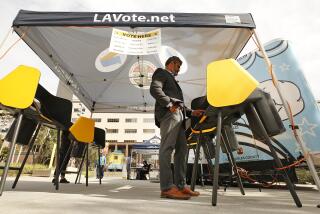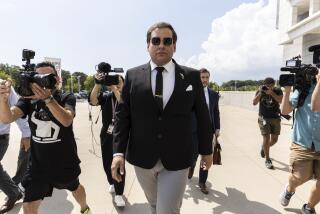Zaccaro Enters Guilty Plea to ‘Scheming to Defraud’
- Share via
NEW YORK — John A. Zaccaro, whose tangled finances clouded the vice presidential campaign of his wife, Geraldine A. Ferraro, pleaded guilty Monday to a misdemeanor--”scheming to defraud”--and acknowledged that he had falsely inflated his net worth on a loan application to purchase apartment houses.
Zaccaro’s plea came on one count of a three-part indictment charging also that from February, 1983, to March, 1984, he submitted a false sales contract and altered a copy of a real estate appraisal.
After fighting his way through a blaze of television lights and a phalanx of reporters, Zaccaro stood quietly in an 11th-floor courtroom in Manhattan Criminal Court.
“Mr. Zaccaro, have you read this indictment?” Judge George Roberts asked.
“Yes, I have,” he replied.
“Do you understand it?”
“Yes, I do.”
“How do you plead?” the judge asked.
“Guilty,” Zaccaro said.
Roberts said that, because of an agreement between the prosecutors and Zaccaro’s lawyers, he would not impose a jail sentence. He set sentencing for Feb. 20 and indicated that Zaccaro could face a $1,000 fine. Zaccaro could also lose his real estate broker’s license because of the conviction, according to state authorities who are conducting a separate investigation.
In a written statement, Zaccaro said, “My plea hopefully puts an end to the inquiries and the microscopic attention given to my personal and business affairs since July,” when Walter F. Mondale chose Ferraro as his running mate,making her the first woman to run on a major party’s national ticket.
Ferraro, in a statement issued from her home, said that her husband had “tried to help a client and in doing so committed a judgmental error.”
“He has freely admitted his mistake, and for this I am proud of him,” Ferraro said. “John is a decent, honorable man, and today’s events do nothing to change him in the eyes of his family and friends. We love him very much.”
As he stood surrounded by dozens of reporters after the court session concluded, Zaccaro’s lawyer, Arthur Liman, summed up the feelings of his client. “The campaign of 1984 is over. . . . He feels lousy,” Liman said.
Long Wait for Trial
Liman said that, because of crowded court calendars, it could have been a year before Zaccaro’s case came to trial.
“John decided he did not want to submit his wife and family to long proceedings,” the lawyer said. “I believe John had a defensible case. . . . There has never been a misdemeanor case in history that has had such publicity. His plea here is the end to the 1984 Democratic presidential campaign.”
No members of Zaccaro’s family were in court. Liman said that Ferraro had wanted to accompany her husband, but Zaccaro had insisted that she stay home.
The indictment said that the scheme’s objective was to provide John DeLorenzo, a business associate of Zaccaro, with funds to consummate real estate acquisitions and, thus, generate commissions for Zaccaro. Manhattan Dist. Atty. Robert M. Morgenthau said that DeLorenzo had cooperated with his office and was not named in the indictment.
Financing for Apartments
In an effort to obtain financing for DeLorenzo’s purchase of the Yellowstone Houses, a five-building apartment complex in the New York City borough of Queens, Zaccaro in June, 1983, submitted to a mortgage broker a false sales contract, the indictment alleged. The document showed the purchase price of the complex as $15.5 million, but the actual price was $11.98 million, the district attorney said.
Five months later, according to the indictment, Zaccaro changed the date and the address on an appraisal of the property. The same month, he signed a loan application that was submitted to Prudential-Bache Securities stating his net worth as $21,640,000. The indictment charged that the figure was “materially inaccurate” because Zaccaro’s net worth at the time was no more than $4 million, “as he well knew.”
Morgenthau said that, had the deal gone through, Zaccaro would have received a $333,000 commission plus more than 8% of the income from the buildings.
Liman said that, despite Zaccaro’s guilty plea, his client did not know that the contract contained false statements. He said the contract had been submitted by mistake and the false statements were caused by the shuffling of papers from two documents.
Associate Indicted
Also indicted was Harold Farrell, a business associate of Zaccaro. Farrell appeared in court just before Zaccaro and pleaded not guilty to a misdemeanor charge of “scheming to defraud in the second degree” in connection with a credit union loan for the purchase of a Manhattan apartment house.
At a news conference before Zaccaro’s guilty plea, Morgenthau said that Ferraro’s candidacy “had no impact whatsoever” on his office’s investigation, which he said would have been pursued no matter who the defendant was. The district attorney said that the life of the grand jury that indicted Zaccaro had been extended to consider related matters.
“This phase has been completed. There could be another phase,” he added, but he refused to amplify.
Questions of family and business finances dogged Ferraro’s campaign almost from the start. Zaccaro first balked at releasing his income tax returns but relented under public pressure.
Tax Debt Disclosed
Ferraro disclosed that she and her husband owed more than $70,000 in federal, state and local taxes because of a 1978 accounting error. At the same time, Ferraro pledged to give up her share in her husband’s real estate business and to resign as an officer of his company.
In the middle of the campaign, Zaccaro was removed as the conservator of an elderly woman’s estate after he admitted that he had borrowed $175,000 from the estate to make a deposit on behalf of one of his real estate partners.
More to Read
Get the L.A. Times Politics newsletter
Deeply reported insights into legislation, politics and policy from Sacramento, Washington and beyond. In your inbox three times per week.
You may occasionally receive promotional content from the Los Angeles Times.










